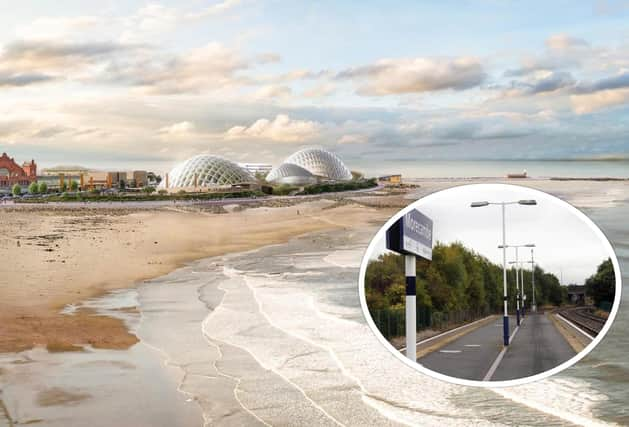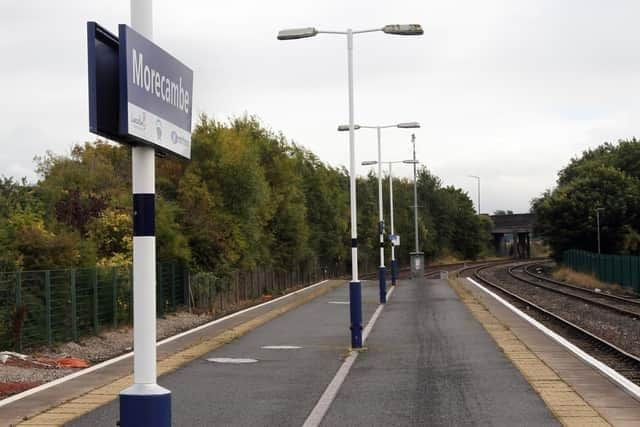Eden Project Morecambe needs electric rail link for visitors, councillor says - but where will the money come from?


Green party group leader Gina Dowding says such a project - or a battery-powered alternative - should be a priority in order to create a low-carbon transport option for visitors to the Eden Project Morecambe attraction when it opens in 2026. However, a motion she brought before a full council meeting at County Hall last month, making that case, was defeated.
It came after members heard that as-yet-unpublished rules dictating how the authority will be able to use the £494m it has been promised from the government’s Local Transport Fund (LTF) were unlikely to permit an electrification scheme.
Advertisement
Hide AdAdvertisement
Hide AdDuring a Commons debate last week on another potential LTF project for Lancashire - the reopening of Midge Hall station in South Ribble and the removal of buffers at Ormskirk station in order to create a direct link to Liverpool - transport minister Huw Merriman said Whitehall would “shortly publish advice for local authorities" to help them make the most of the funding they are due to receive.


He stressed that local transport authorities like the county council would have “the freedom to choose from a range of projects” - building new roads and improving railway stations among them - but did not refer to rail electrification.
Speaking to the Local Democracy Reporting Service (LDRS) in the wake of the minister’s comments, County Cllr Dowding - who represents the Lancaster Central division - said it remained unclear whether her vision for electrifying the route to Morecambe would be an eligible scheme, but asked: “If not via the HS2 monies, then how else?”
“For Eden North to be successful, it will mean thousands upon thousands of visitors coming every week. That [requires] better public transport, which is reliable and low carbon.
Advertisement
Hide AdAdvertisement
Hide Ad“But there is a need to look at the transport infrastructure in Morecambe itself. We can't have cars parking all over the place in residential areas and we also need more pedestrian areas along the seafront to make sure the visitor experience is peaceful and safe - and an enjoyable one.
“It’s imperative that Lancashire County Council prioritises sustainable travel in the north of the county. So…I sincerely hope we get funding for these measures - and quickly,” County Cllr Dowding added.
At the meeting during which the motion - which was supported by Labour and Liberal Democrat members - was ultimately defeated, County Hall’s Conservative cabinet member for economic development and growth Aidy Riggott said it was “too early in the process to make spending decisions”.
He also noted that from initial conversations with officials from the Department for Transport, “it looks almost certain that the guidance will not support funding for the construction of rail infrastructure such as the electrification of the [Morecambe] line”.
Advertisement
Hide AdAdvertisement
Hide AdHowever, County Cllr Riggott said the authority already had “a clear idea of the projects we think can bring the biggest benefit to our economy, businesses and residents".
“Once the guidance is published, we will be talking to Lancashire’s MPs about what they see as the key priorities,” he added.
Labour’s Lancaster East division representative Lizzi Collinge told the gathering that there was a “cross-party consensus” in Lancaster and Morecambe for improved public transport - and paid tribute to Lancaster Civic Vision for initiating the campaign for the electrification of the Morecambe line.
However, County Cllr Alan Schofield, the Tory member for Ribble Valley South West, said County Cllr Dowding's motion - which also pushed for LTF money to be used on public transport, walking and cycling infrastructure in Lancaster city centre - amounted to an “audacious and blatant” early bid for a share of the £494m set to come Lancashire’s way between 2025 and 2032.
Advertisement
Hide AdAdvertisement
Hide AdHe added that spending priorities needed to be determined “on a proper basis [and] in proper time”.
GREEN LIGHTS ALL THE WAY?
Although the government has yet to publish its full guidance for local authorities on how the Local Transport Fund can be spent, it has offered examples of potential schemes which could be financed by the cash pot:
***building new roads and improving junctions;
***installing or expanding mass transit systems;
***improving roads by filling in potholes and [installing] better street lighting for personal safety;
***improving journey times for car and bus users by tackling congestion;
***increasing the number of EV chargepoints;
***refurbishing bus and rail stations;
Advertisement
Hide AdAdvertisement
Hide Ad***improving streets so they are safer to walk children to school and increasing accessibility for all.
The Department for Transport (DfT) says the investment - part of its 'Network North' plans to redistribute saved HS2 cash across the North and Midlands - will give local authorities “long term certainty to invest in transformative and ambitious transport improvements”.
“Councils will work with local MPs and will be held to account by the government, as well as their communities, to make sure the money is spent promptly and effectively. Local councils will be expected to publish their delivery plans for which projects they wish to invest in,” the DfT says.
Comment Guidelines
National World encourages reader discussion on our stories. User feedback, insights and back-and-forth exchanges add a rich layer of context to reporting. Please review our Community Guidelines before commenting.